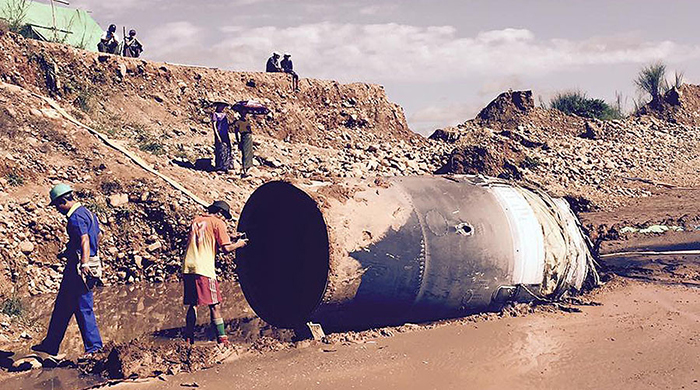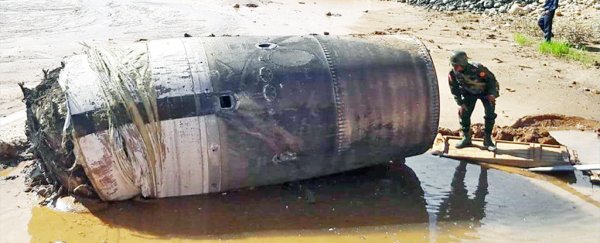A huge metal cylinder that looks like it could be part of a Chinese rocket has crash-landed next to a village in Myanmar, luckily not injuring or killing anyone in its path.
The 4.5-metre-long (14.8-foot) tube is suspected to be part of a Chinese rocket that launched from Jiuquan in China last week - around 1,610 kilometres (1,000 miles) away - after Chinese writing was found on parts of the debris.
Residents in the area were pretty shaken up by the sudden arrival - locals reported hearing a loud explosion around 6am local time and saw the cylinder bounce approximately 50 metres (164 feet) across land owned by a mining company in Hpakant, in the northern state of Kachin.
The metal object eventually came to rest in a waterlogged area.
Nov 10, 5pm, attached object fell off of the sky at Tin Aung Kyaing mining lot in Hpakant Jade tract. pic.twitter.com/mdMr2fq5rD
— FreeKachin (@FreeKachin) November 10, 2016
"Every local thought it was the explosion of heavy artillery," villager Ko Maung Myo told Zaw Zaw Htwe at The Myanmar Times. "I walked over to it and saw it was part of an engine."
Fortunately, nobody was hurt by the falling debris, although a smaller fragment of the rocket smashed through a nearby roof.
News reports reveal that electronics and wiring have been seen inside the unidentified object, but so far, there's been no official explanation as to what it is or where it came from.
Experts suspect that the wreckage is likely to be part of the Long March 11 Chinese rocket that launched from Jiuquan last Wednesday, carrying five navigational satellites into orbit.
"Myanmar is directly to the south of the launch site and this would put the country directly under the launch trajectory for that rocket," space debris researcher Clemens Rumpf from Southampton University in the UK told The Guardian.
 Credit: Yannaing Pyi Sone Aung/Facebook
Credit: Yannaing Pyi Sone Aung/Facebook
"It is entirely plausible that the first or second stage of the rocket could have come down there," he added. "In general, the first stage of any rocket does not make it to orbit and thus falls down somewhere downrange from the launch site."
Booster rockets are built to drop back down to Earth once they've carried their payloads to space, but the normal plan is to have them parachute softly into the ocean, based on a carefully planned trajectory.
Or at least, that's what happens right now - in the future, we might have reusable rockets that can return to their launch pads ready for the next mission, saving millions of dollars along the way.
It's not yet clear why this booster rocket - if that's what this is - didn't come down in a safer manner, but at least we can be thankful that there were no injuries.
While incidents like this are very rare, they do happen from time to time, so you might want to keep your eyes on the sky… just in case.
